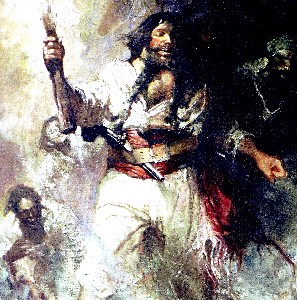
History of Pirate Surgeons Menu: 1 2 3 4 5 6 7 8 9 10 11 12 Next>>
The History of Sea and Pirate Surgeons, Page 7
The Sea-Surgeons Amongst the Pirates
Once captured, a surgeon had to make the best of his situation. He also had to be cautious of what favors he accepted from the pirates and which services he offered to them or he would be branded a pirate himself. From period piracy trial accounts, it becomes apparent that surgeons were thought to be innocent until proven otherwise. When Bartholomew Roberts' crew were captured, surgeon Peter Scudamore was "treated with all Humanity, and very unlike a Prisoner, on account of his Employ and better Education, which had rendred him less to be suspected [of piracy than the rest of the prisoners]."1
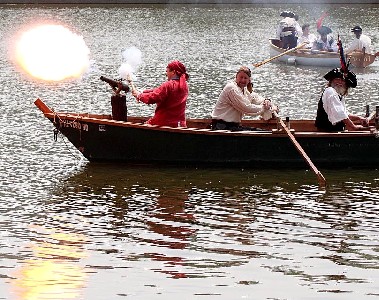
Photo: DB Couper
A surgeon should never do this when someone was looking
A surgeon on a pirate's ship would have done well to avoid helping the pirates to capture or board and plunder ships. During the trial of some of Roberts' pirates, a group of men explained that, "Roberts commanded us into the Boat, and the Quarter-Master to rob the Ship; neither of whose Commands we dared to have refused."2 To which the court replied "And granting it so, those are still your own Acts, since done by Orders from Officers of your own Election. Why would Men, honestly indisposed, give their Votes for such a Captain and such a Quarter-Master as were every Day commanding them on distastful Services?"3 So the burden of proof following such behavior was definitely on the defendant. Pirate surgeon Scudamore has a great deal of trouble explaining why he took surgeon's chests and instruments from various ships Bartholomew Roberts had captured.
A surgeon on a pirate ship was also advised to avoid was taking any of the plunder. Buccaneers cheerfully awarded extra
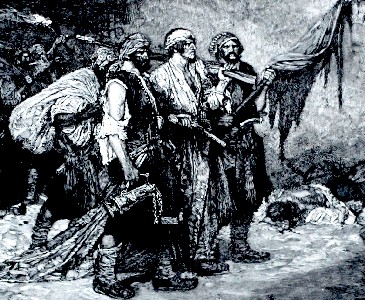
Artist: Howard Pyle - Looting following The Sacking of Panama (1887)
shares to their surgeons, who could accept this largesse because they were protected by the Letter of the Marque. A pirate surgeon had no such protection. Accepting plunder was equivalent to taking part in the pirate attacks. At Kencate's trial, Dow and Edmonds tell us that "he never shared with them [the plunder], nor signed their articles. The court then cleared the doctor".4
Still, some surgeons were more than happy to accept their share of the loot. During pirate surgeon George Wilson's trial, Adam Comry explained that "Wilson told him, he hoped he should carry [the election to the position of Chief Surgeon] from [Peter] Scudamore, for that a quarter Share (which they had more than others) would be worth looking after".5 Wilson was referring to the fact that the Chief Surgeon of Roberts fleet was given a share and a quarter where regular surgeons only received one share like the other men on the ship. At his trial Wilson rather lamely sidesteps Comry's accusation because admitting that he accepted pirate loot was akin to admitting he was himself a pirate.
1 Captain Charles Johnson, The general history of the pyrates, p. 309; 2 Ibid.; 3 Ibid., p. 295; 4 George Francis Dow and John Henry Edmonds, Pirates of the New England Coast, p. 303; 5 Johnson, General History, p. 313
Mutineers and Sea-Surgeons
Pirate mutineers faced a special problem with regard to the surgeon on their ship. A surgeon was usually an officer on a ship and thus had no reason to side with mutineers and several reasons to
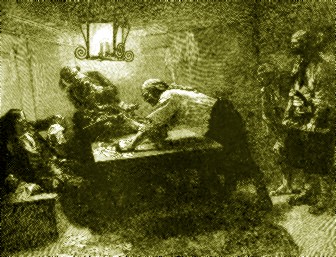
Artist: Howard Pyle - Capture of the Galleon (1921)
work against them. Still, if he could be convinced or even forced to perform his station for the mutineers, he would be an important addition to their crew. When William Fly's men mutinied, they killed the captain (Green) and his mate and threw them overboard. So trusted was the surgeon by these officers that the mate "Cryed out to the Doctor, for God’s sake, to give him a Rope"1. As a result, Fly himself "secured him, as he lay in his Bed, and put him in Irons."2
However, they "debated what should be done with the doctor. Some were for sending him to look after the captain and mate [who had been killed]; but the majority, as he was a useful man, thought it better to keep him."3Captain Green's surgeon must not have been very cooperative to Fly, however, because when they later decided to release a ship they had plundered, the John and Betty, they put the surgeon, "who had steadfastly refused to serve the pirate company" on board and let him go.4
Not all ship's surgeons were quite so fortunate, however. Johnson gives us another account of a group of mutineers who took Captain Walron's ship in 1722 while he
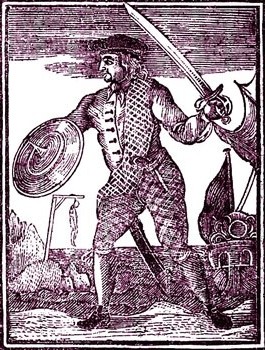
John Gow, General History of Pirates, p. 112 (1725)
was entertaining a group of merchants at dinner. When the mutineers struck, "they pulled out their Pistols and shot the Captain, Surgeon, and another dead, and grievously wounded the Lieutenant; but he getting out of the Window upon a Side-Ladder, thereby saved his Life, and so they made themselves Masters of the Ship in an Instant."5
Similarly, when John Gow's men mutinied aboard the Caroline in 1724, they "cut the Throats of the Mate the Doctor and Super Cargoe as they lay in their hammocks, and the Doctor [identified here as John Guy] after his Throat was cut came upon Deck and fell down by the Man at the helm and the s[ai]d John Winter threw him over board"6. Johnson gives a more dramatic account, noting that "The Surgeon, Thomas Guy, came up after his Throat was cut and fell cross the Tiller, from whence they took him and flung him overboard after the Captain."7 (The actual name of the surgeon here is uncertain, but it probably John, not Thomas. Johnson's book contains a variety of other, identifiable errors so this is likely one as well.) Not ones to waste concern over the deceased or even their clothing, pirate James Williams traded "an old Coat to Michael the Irish Man for the Surgeons scarlet Cloath Jacket and Breeches"8.
It is likely that pirate captain Henry Every's surgeon John Devine was taken and coopted into service when the crew aboard the warship Charles II mutinied. Being a surgeon and familiar with the crew, they would have wanted him. His resounding acquittal hints that this may have been the case. When Devine was brought to trial in the Bahamas, " the Court found the within mentioned John Devin not Guilty, upon which the s[ai]d John Devin was cleared by proclamation" and even given a certificate to prove it.9 This proved useful to him when he returned to his home town of Boston and set up practice in 1704 and was arrested a second time.10
1,2 The Tryals of Sixteen Persons for Piracy &c., 1726, p. 22; 3 Captain Charles Johnson, The History of the Pirates, p. 136; 4 George Francis Dow and John Henry Edmonds, Pirates of the New England Coast, p. 332; 5 Captain Charles Johnson, The general history of the pyrates, p. 38; 6 “33. James Williams, from The Examination of James Williams, 27 March, 1725. HCA 1/55 ff. 103-104”, Pirates in Their Own Words, Ed Fox, ed., 2014, p. 162; 7 Johnson, General History, p. 421; 8 “33. James Williams, from The Examination of James Williams, 27 March, 1725. HCA 1/55 ff. 103-104”, p. 163-4; 9 "66. Certificate for John Devin (Bahamas). September (?) 29th 1698.", Privateering and Piracy in the Colonial Period - Illustrative Documents, 1923 (reprint), p. 162; 10 "67. Certificate for John Devin (Massachusetts). October 25th, 1698.", Privateering and Piracy in the Colonial Period - Illustrative Documents, 1923 (reprint), p. 163
The Medicine Chest Hostage in the Golden Age of Piracy
A medicine chest was a large, box containing the ingredients required to make the medicaments used during this time in history. These medicines were all labeled in Latin and usually required the aid of an apothecary [what we call a druggist] or physician [a highly trained medical man oriented more towards medical theory than a surgeon was] to be properly used. Surgeons were forbidden from making medicines in London as it was the purview of the apothecaries and physicians. At sea, however, there were rarely physicians or apothecaries to be had, so the surgeon was able to make the drugs he required in peace. A medicine chest was thus an essential element of the sea-surgeon's trade and all good sea-surgeons bought one before a voyage began, refilling it as needed along the way.
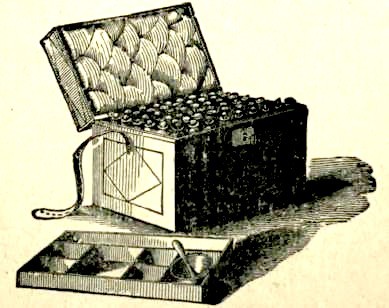
A Later Period Medicine Chest (back) and Plaster Box (front)
Since pirates were criminals, they had a difficult time legitimately obtaining the necessities required by a ship's crew such as a medicine chest. So they acquired medicine chests the same way they acquired surgeons: they stole them.
During pirate surgeon Peter Scudamore's trial, several witnesses commented on him stealing medicine chests. The variety of chests that Bartholomew Roberts' crew took are highlighted Scudamore's defense. "The King Solomon, and Elizabeth Medicine-Chest, he owns he plundered, by Order of Hunter, the then chief Surgeon, who, by the Pyrates Laws, always directs in this Province, and Mr. Child, (tho' acquitted) had by the same Orders taken out a whole French Medicine-Chest, which he must be sensible for me, as well as for himself, we neither of us dared to have denied".1
In addition to regular pirates, there are two separate accounts of cities being held hostage for medicine chests. The first is of Edward Low. Leo Eloesser tells us that while in "the French West Indies it came to a head that he wanted a doctor's chest, so he put four French captives aboard a prize sloop and sent them off to St. Thomas to tell the Governor that if he'd not sell him a good chest for the money his captive brought with them he'd kill all the Frenchmen and burn ten or more French vessels that he had in his hands. His captives returned with the chest."2
Perhaps the most famous ransom for a medicine chest was by the infamous Blackbeard after he had taken a port in North Carolina.
Artist: Frank Schoonover (1922)
A Fanciful Drawing of Blackbeard in Smoke and Flames Teach detain'd all the Ships and Prisoners, and being in want of Medicines, resolved to demand a Chest from the Government of the Province [off Charlestown]. Accordingly Richards the Captain of the Revenge Sloop, with two or three more Pirates, were sent up along with Mr. Marks, one of the Prisoners whom they had taken in Clark's Ship, to make their Demands, which they did in a very insolent Manner, threatening, that if he did not send immediately the Chest of Medicines, and let the Pirate Ambassadors return, without offering any Violence to their Persons, they wou'd murder all their Prisoners, send up their Heads to the Governor, and set the Ships they had taken [in the harbor] on fire. The Government were not long in deliberating upon the Message tho' 'twas the greatest Affront that could have been put upon them, yet for the saving so many Mens Lives, (among them, Mr. Samuel Wragg, one of the Council,) they comply'd with the Necessity, and sent aboard a Chest, valued at between 3 and 400 l. [Pounds] and the Pyrates went back safe to their Ships.Blackbeard, (for so Teach was generally called, as we shall hereafter shew) as soon as he had received the Medicines and his Brother Rogues, let go the Ships and the Prisoners, having first taken out of them in Gold and Silver, about 1500 l. Sterling, besides Provisions and other Matters.3
The medicine chest clearly was immensely valueable to the pirates. It is curious that no surgeon is ever mentioned in the account of Blackbeard. Did the pirates take the medicines, guessing at which might cure their ills? More likely Blackbeard had pressed men into service who were not mentioned in Johnson's account. Kevin Duffis notes in his book The Last Days of Blackbeard that one of the later ships the pirate took, La Concorde, contained a surgeon, Jean Dubert and two assistants, Marc Bourgneuf and Nicolas Gautrain.4 It is doubtful that a crew who so badly needed a surgical chest would then pass up the men best capable of administering it.
1 Captain Charles Johnson, The general history of the pyrates, p. 310; 2 Leo Elosesser, "Pirate and Buccaneer Doctors", Annals of medical history, Vol. VIII, Issue 1, 1926, p. 53-4; 3 Johnson, General History, p. 74; 4 Jacques Ducoin, Compte rendu de recherches dans les archives francaises sure le naivre natais La Concorde capture par des pirates en 1717, p. 90-1

